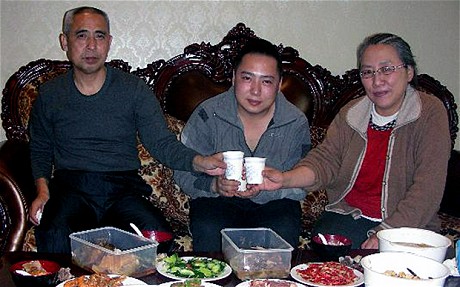| Associated Press |
| October 15, 2012 |
| By Louise Watt |
|
|
|
|
Mr. Hada, son Uiles and wife Xinna
|
The wife of a long-imprisoned ethnic Mongolian activist in China said Monday that she has spent nearly two years in detention and house arrest on a fabricated charge to silence her family, and that her husband is suffering from depression.
Xinna told The Associated Press by telephone that her husband, Hada, who was accused of separatism and spying in China's region of Inner Mongolia and has been detained for 17 years, has become "very depressed" in custody. Many ethnic Mongolians use only one name.
Xinna appealed for the international community to help win Hada's release.
"He is in a very bad state," Xinna said by telephone Monday from the regional capital of Hohhot, adding she has seen her husband about once a month recently.
"I asked him to walk around, but he wouldn't. The doctor suggested that he should be transferred to a mental health hospital, but they won't allow that. They don't even give him toilet paper," she said.
She said he is being kept at a police-rented compound inside an ecological park near Hohhot airport.
Xinna, 57, said she and her son, Weilesi, 28, were initially detained at the same place in December 2010 — she on charges of bootlegging CDs and he on drug charges — and that both have been under tight surveillance since her release in April.
Weilesi was released on bail in September 2011, and authorities decided not to prosecute him last month, Xinna said. She was given a three-year sentence in April that was commuted to house arrest. Both have denied any wrongdoing, and Xinna said the charges were aimed at silencing them.
While ethnic separatism is not well known in Inner Mongolia, it's a sensitive issue for China's government, which fears the spread of the violent unrest that has hit its regions of Tibet and Xinjiang in recent years.
Repeated calls to police and government offices in Hohhot rang unanswered Monday.
Chinese authorities routinely harass family members of prominent dissidents, subjecting them to monitoring, questioning, house arrest or detention to silence them or to pressure the activists into compliance.
Hada formed a political group in the early 1990s that strived for self-determination for Inner Mongolia, a Chinese region bordering the independent state of Mongolia. The family bookstore in Hohhot became the center of the movement.
A court ordered Hada to spend 15 years in prison and to be deprived of his political rights for four years. At the time of his scheduled release in December 2010 he was detained again by authorities. Xinna and Weilesi were taken into custody shortly before Hada's scheduled release.
Xinna said police told them they were keeping him detained because he had been deprived of his political rights. Under Chinese law, people deprived of their political rights are subject to police surveillance and lose the freedoms of speech and assembly.
Mother and son now share a rented house in a Hohhot suburb.
"There are several cameras that have been installed around my house," Xinna said. "If I go out I need to get approval from authorities and I am followed by police."








